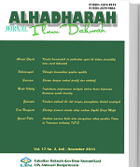Aktualisasi Self-concept dalam Mewujudkan Tujuan Dakwah (Pendekatan Psikologi Dakwah)
DOI:
https://doi.org/10.18592/alhadharah.v12i23.1765Keywords:
self-concept, the nature of human, psychology, personality, dakwah objectivesAbstract
This article discusses the actualisation of self-concept in achieving the goals of dakwah through psychological approach. Dakwah is a process of total Islamisation through a series of activities involving transformation, transmission and diffusion of Islamic values and teachings. Dakwah aims at disseminating, developing, explaining and transmitting Islamic values to the individual in order to achieve happiness. This goal can be achieved by developing the human personality through the actualisation of the self-concept as an important part of the human personality to achieve happiness. Self-concept as a description of a person about himself integrated with the combination of physical, psychological, social, emotional, aspirational, and religious beliefs and accomplishments to be achieved. A person with a positive self-concept will be able to direct themselves optimally to achieve the dakwah objectives, namely salvation and happiness in the world and the hereafter.References
Abidin, Masoed. 1999. Gerakan Dakwah Bangun Negeri. Jakarta: Gema Insani Press A.S, Roosdi. 1992. Dakwah Aktual: Solusi Problem Keberagamaan Umat. Jakarta: Gema Insani Press Available: http://www.tujuandakwah.wikipedi a.com dalam Surya Hasby, dkk.,
Dakwah Secara On Line, (Oktober, 2009) Aziz, Jumaah Amin Abdul. 2005. Fiqh Dakwah: Studi Analisis berbagai Prinsip dan Kaidah yang harus dilakukan dalam Dakwah Islamiyah. Jakarta: Intermedia Burn, R.B. 1993. Konsep Diri: Teori, Pengukuran, Perkembangan dan Tingkah Laku. Jakarta: Arcana. Baiquni, Akhmad. 1985. Tugas Ganda Manusia. Jakarta: Salahuddin Press. Bustaman, Hanna Djumhana. 1995. Integrasi Psikologi dan Islam: Menuju Psikologi Islami, Yogyakarta. Pustaka Pelajar. Combs, A.W, Avilia D, Purkey W.W. 1949. Helping Reletionship Basic for the Helping Profession. Boston: Alyin & Bacon. Dahlan M, et al. tt. Kamus Ilmiah Populer. Surabaya: Arkola. Departemen Agama RI. 1995. Al Qur’an dan Terjemahnya. Jakarta: CV. Indah Press. Dita, Wenty P., et al. Self awarennes, Newyork: Norton Fathoni, Miftah Ahmad. 2001. Pengantara Ajaran Islam: Pendekatan Sains Dalam Memahami Agama. Semarang: Gunung Jati. Fuhrmann, Barbara S. 1990. Adolescence Psychology. USA Hafidhuddin, Didin. 2001. Dakwah Aktual. Jakarta: Gema Insani Press Helmi, Avin Fadhilah. 1999. “Gaya Kelekatan dan Konsep Diri”. Jurnal Psikologi, No. 1: 9-17 Natsir, M. Dakwah dan Pemikirannya. Jakarta: Gema Insani Press. Gea, Antonius Atosokhi. 2002. Relaksasi dengan Diri Sendiri. Jakarta: Elex Media Komputindo. Huijbers, Teo. 2000. Manusia Merenungkan Dirinya Sendiri. Yogyakarta: Kanisius. Hurlock, E.B. 1991. Psikologi Perkembangan: Suatu Pendekatan sepanjang Rentang Kehidupan. Jakarta: Erlangga. Iqbal, M. 1982. Reconstrucion in Islam. Jakarta: Tintamas Press. Labib, Ahmad Muzaki. tt. ”Pembagian Hadits.” http:// http://2beahumanbeing.blogspot.co m/2012/06/pembagian-haditsmutawatir-dan-ahad.html. Muntholi‟ah. 2002. Konsep Diri dalam Menunjang Prestasi Belajar PAI. Semarang: ar-Rasail. An-Nabhani, dan An-Nadvi, Habibul Haq. 2000. Dinamika Islam. Bandung: Risalah. Nashori, Fuad. 2000. Kompetensi Interpersonal ditinjau dari Kematangan beragama, Kematangan Beragama dan Jenis Kelamin. Tesis, tidak dipublikasikan, Yogyakarta: UGM. Purwanto, Ngalim. 1999. Psikologi Pendidikan. Bandung: PT. Remaja Rosdakarya. Rahmad, Jalaluddin. 2000. Psikologi Komunikasi. Bandung: PT. Rosda. Rogers, Carl.R. 1959. On Becoming a Person. Boston: Houghton Mifflin Company. Sahid, Hussain. 1977. Iqbal’s Concept of Personal Identity. M. Ma‟ruf (ed.), Lanhore Islamic Books Service. Shomali, M. Ali. 2002. Mengenal Diri. Jakarta: Lentera. Soedarsono, Soemarno. 2000. Penyemaian Jati Diri. Jakarta: Elex Media Komputindo. Supratiknya, A., (ed.). 1993. Teori-teori Psikodinamik: Theories of Personality. Yogyakarta: Kanisius. Raimy, Snygy and Combs. 1949. The Interpersonal Concept Theory of Self. Newyork: Norton. Widyawanti, Maya. 2004. Berkenalan dengan Aliran dan Tokoh Psikologi. Jakarta: Bulan Bintang.
Downloads
Published
How to Cite
Issue
Section
License
Authors retain copyright and grant the journal the right of first publication, with the work simultaneously licensed under the Creative Commons Attribution-NonCommercial 4.0 International Public License (CC BY-NC 4.0). This license allows reusers to distribute, remix, adapt, and build upon the material in any medium or format for noncommercial purposes only, provided that proper attribution is given to the original creator.







